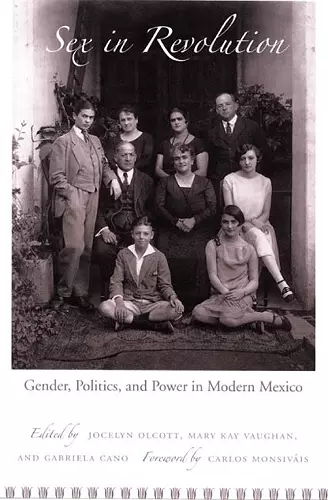Sex in Revolution
Gender, Politics, and Power in Modern Mexico
Jocelyn H Olcott editor Mary Kay Vaughan editor Gabriela Cano editor
Format:Hardback
Publisher:Duke University Press
Published:17th Jan '07
Currently unavailable, and unfortunately no date known when it will be back

Looks at Mexico's social, political, and cultural history during and after the revolution from women's perspective.
A collection of histories showing how women participated in Mexican revolutionary and postrevolutionary state formation by challenging conventions of sexuality, work, family life, and religious practice.Sex in Revolution challenges the prevailing narratives of the Mexican Revolution and postrevolutionary state formation by placing women at center stage. Bringing to bear decades of feminist scholarship and cultural approaches to Mexican history, the essays in this book demonstrate how women seized opportunities created by modernization efforts and revolutionary upheaval to challenge conventions of sexuality, work, family life, religious practices, and civil rights.
Concentrating on episodes and phenomena that occurred between 1915 and 1950, the contributors deftly render experiences ranging from those of a transgendered Zapatista soldier to upright damas católicas and Mexico City’s chicas modernas pilloried by the press and male students. Women refashioned their lives by seeking relief from bad marriages through divorce courts and preparing for new employment opportunities through vocational education. Activists ranging from Catholics to Communists mobilized for political and social rights. Although forced to compromise in the face of fierce opposition, these women made an indelible imprint on postrevolutionary society.
These essays illuminate emerging practices of femininity and masculinity, stressing the formation of subjectivity through civil-society mobilizations, spectatorship and entertainment, and locales such as workplaces, schools, churches, and homes. The volume’s epilogue examines how second-wave feminism catalyzed this revolutionary legacy, sparking widespread, more radically egalitarian rural women’s organizing in the wake of late-twentieth-century democratization campaigns. The conclusion considers the Mexican experience alongside those of other postrevolutionary societies, offering a critical comparative perspective.
Contributors. Ann S. Blum, Kristina A. Boylan, Gabriela Cano, María Teresa Fernández Aceves, Heather Fowler-Salamini, Susan Gauss, Temma Kaplan, Carlos Monsiváis, Jocelyn Olcott, Anne Rubenstein, Patience Schell, Stephanie Smith, Lynn Stephen, Julia Tuñón, Mary Kay Vaughan
“This anthology touches on a wide range of themes: female colonels in the revolution, machismo applied with scissor snips in Mexico City, the cinematographic treatment of indigenous women, divorce in conservative circles, women’s education, the construction of new families, labor-union life, rationalized sex, activism among women in Catholic and rural organizations, and sexism in the Popular Front. Despite the variety, the book offers a complex, coherent panorama, energetically distancing itself from generalizations. It is well known that God, the devil, and attentive readers are in the details.”—Carlos Monsiváis, from the foreword
“This path-breaking book fundamentally changes our view of the Mexican Revolution as a man-made affair. The women who struggled against patriarchal authority as workers, teachers, feminist activists, soldiers, peasants, students, and mothers come alive in these pages—as do their adversaries. The chapters brilliantly mesh theoretical analysis with fine-grained historical accounts of gendered challenges to Mexico’s social order. This book’s importance reaches far beyond the Mexican case as it grapples with universal questions of authority, gender, and revolution.”—Elizabeth Dore, author of Myths of Modernity: Peonage and Patriarchy in Nicaragua
“[A] crisp, well-integrated set of articles focused primarily on the experience of women during and after the Mexican Revolution of 1910. . . . Instructors will find many of the individual essays in this collection useful for helping students appreciate the ways in which the Mexican Revolution was or was not a revolution for women. For those undertaking research, this engaging collection complements other recent work on the topic. . . .” -- Katherine Elaine Bliss * Hispanic American Historical Review *
“[A] valuable, fresh contribution to gender studies in Mexico from a perspective further removed from the revolutionary period. . . . [T]his is a remarkable volume for the scope and depth of its contents and analysis and for its documentation of the challenges by the women of Mexico to the entrenched social order. It represents a remarkable and commendable effort that contributes to our changing view of the Mexican Revolution and its long aftermath.” -- Carmen Ramos Escandón * Signs *
“One of the book ’s most notable qualities lies in the way in which it emphasises women ’ s agency in the re-negotiation of hegemonic gendered practices and cultural patterns in a variety of social situations and localities, thus contesting dominant narratives of the revolutionary period. . . . [A]n important contribution to discussions about historical patterns of gender, politics, and women’s agency and activism in Mexico.” -- Daniel Nehring * Bulletin of Latin American Research *
ISBN: 9780822338840
Dimensions: unknown
Weight: 576g
336 pages